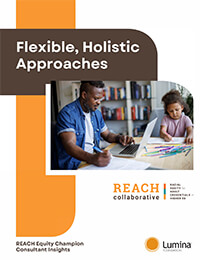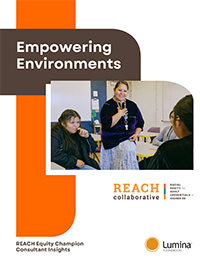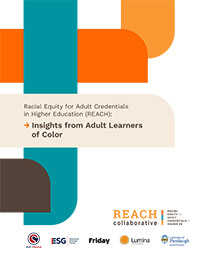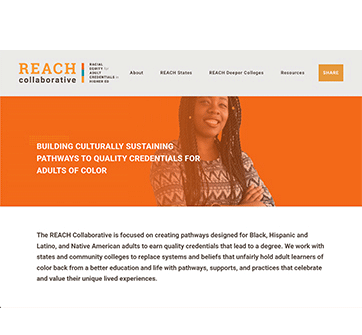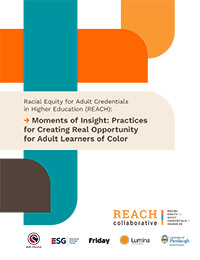
It’s a moment of insight. A second of clarity that leads to a breakthrough in creating real opportunity for adult students of color — on a community level and as individuals with unique goals and dreams. That instant when the big questions are followed by even bigger answers: WHO aren’t we serving? WHY aren’t they enrolling? WHAT could we do to better support their needs and help them stay on their pathways? HOW can we create environments where they feel seen and welcome?
It’s one point in time that has a significant impact, because it’s the beginning of taking action. It makes other moments possible. Certificates and degrees completed. Careers launched. Lives transformed.
Find your moment of insight with inspiring examples and practical strategies from the REACH Collaborative.
Flexible, Holistic Approaches
Supporting adult students of color means offering flexibility and practical resources that take students’ realities into account, including job schedules, transportation needs, and how their professional ambitions interact with workforce demands. Colleges can help students juggle education, career, and family by offering comprehensive solutions like hybrid classes, accelerated schedules, peer mentoring, or childcare. By using data to adapt to their needs, these institutions make success possible for every student.
Taking a Community-centered Approach to Serving Native American Adults in Colorado
Pueblo Community College took the call to meet adult learners of color where they are quite literally, taking their REACH programs off campus and onto nearby tribal lands. By showing respect for the rich culture of the Ute Mountain Ute tribe and taking a flexible, holistic approach to meeting the needs of the community, the college has developed a strong relationship that is leading to more credentials for a traditionally underserved community.
More inspiration from REACH colleges
- Forsyth Community College:
Encourages open house attendance by offering food and childcare for parent students.
- Chaffey College:
Offers a non-credit, work-based course to help student employees receive skill development tailored to their roles.
- Germanna Community College:
Provides wraparound supports for formerly incarcerated students.
- Eastern Shore Community College:
Organizes workforce programs at the correctional facility within their service area.
- Corning Community College:
Offers micro-credentials aligned with industry credentials to help adult learners build confidence and in-demand skills.
- McDowell Technical Community College:
Offers a credit for prior learning policy aligning workforce development and curriculum classes.
- Westchester Community College:
Maintains an experiential learning policy to accelerate incoming adult learners with work experience but no college credits.
- Pikes Peak Community College:
Delivers courses in an accelerated, hybrid format outside of business hours to support working students.
Strong Relationships
Strong connections between students, faculty, employer, and community partners are vital to supporting adult students of color. Faculty and staff become trusted guides, while partnerships with local organizations and businesses open career pathways and offer key resources. These long-term relationships help adult students of color get the support and encouragement they need to stay the course, persist in their programs, and thrive.
Partnering With Employers to Benefit Adult Learners in Virginia
Virginia Western Community College has leveraged employer relationships at every stage of developing its REACH pathways: determining which programs to focus on, gaining access to prospective students, and assisting with tuition costs. Partnerships developed to support the college’s criminal justice program have proven mutually beneficial. Best of all, adult learners of color are ultimately the ones reaping the rewards.
More inspiration from REACH colleges:
- Central Carolina Community College:
Works with an advisory of local pastors to better understand and support students.
- Forsyth Community College:
Offers dedicated success coaches who connect students to resources and motivate them to persist and complete their programs.
- McDowell Technical Community College:
Convenes a Workforce Pipeline Committee quarterly to discuss connecting students to local jobs.
- Central Virginia Community College:
Leverages relationships with community partners to raise awareness about new career pathways.
- Asheville-Buncombe Technical Community College:
Coordinates cohorts for BIPOC students to receive a faculty college mentor.
- Finger Lakes Community College:
Partners with a community organization to address transportation issues.
- SUNY Westchester Community College:
Coordinates a committee that regularly evaluates pathways and shares insights with the campus and state.
- Gaston Community College:
Works with a local hospital to promote its licensed practical nurse (LPN) pathway
Empowering Environments
Adult students of color bring rich experiences and perspectives to college, assets they are eager to show and share with their peers and educators. When colleges create spaces where student voices are heard, input is valued, and feedback is incorporated, they help students feel recognized and supported in sharing their unique viewpoints – and allow the rest of the college community to benefit from their contributions.
Leading by Listening to the Voices of Adult Learners in North Carolina
Adult learners of color know what they want and need better than anyone else. The team at Forsyth Tech Community College took that belief to heart while developing its REACH pathways. When adult students told them what they needed were opportunities to build community and speak their truth, college staff worked collaboratively to make that happen.
More inspiration from REACH colleges:
- Colorado Northwestern Community College:
Created a multicultural area based on student requests for a space that would meet their needs.
- Ulster County Community College:
Actively includes adults of color in campus-wide discussions about student access, success, and campus culture.
- Central Virginia Community College:
Partners with the Monacan Indian tribe in Virginia to ensure tribe members have access to college resources at home.
- Eastern Shore Community College:
Offers noncredit courses that embed financial and digital literacy, professional skill-building, and can be used as credit for prior learning upon completion.
- McDowell Technical Community College:
Offers quick meals students can eat before class to ensure comfort and focus.
- Sandhills Community College:
Facilitates a male, minority mentoring program to provide resources and community to male students of color.
- Mountain Gateway Community College:
Offers career center support to empower nontraditional students and students of color.
- Lenoir Community College:
Offers workforce program advising, website, outreach, and instruction in Spanish.
Visit the website
These and many more resources are available in the Resources section of the REACH Collaborative website.
